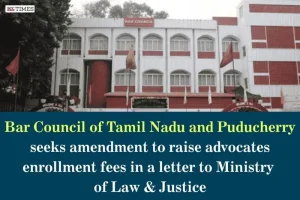Disclaimer: This has been reported after the availability of the order of the Court and not on media reports so as to give an accurate report to our readers.
Bar Council of Tamil Nadu and Puducherry: In a letter dated 17-11-2025, the Chairman of the Enrollment Committee of the Bar Council of Tamil Nadu and Puducherry (“the Chairman”) requested the Law Minister, Ministry of Law and Justice, for an urgent legislative amendment to revise the statutory enrollment fee under Section 24(1)(f) of the Advocates Act, 1961(“the Act”), in the upcoming Winter Session of the Parliament.
The Chairman sought this amendment in light of the recent Supreme Court judgment titled Gaurav Kumar v. Union of India, (2025) 1 SCC 641, wherein the Court unequivocally held that State Bar Councils cannot collect an enrollment fee or any amount in kind beyond Rs 750 prescribed under Section 24(1)(f) of the Act at the time of enrollment. The Court further clarified that all charges, irrespective of their nomenclature or purpose, when collected at the time of enrollment, will be treated as “enrollment fees.” Consequently, the Court held that no State Bar Council or even the Bar Council of India, as statutory delegates, could enhance or alter the fee prescribed under Section 24(1)(f).
The Chairman stated that the legal position laid down created a situation of grave concern for State Bar Councils across the country.
He contended that the enrollment fee of Rs 750 was last revised in 1993, more than three decades ago, when administrative expenses, economic conditions, and regulatory responsibilities were entirely different. In the present context, with steeply rising operational costs, expanding technological requirements, digitisation needs, increased administrative workloads such as verification of educational certificates from the respective schools and colleges and the criminal backgrounds of the candidates, the statutory fee was wholly inadequate to meet the basic administrative requirements, or even for the nominal expenses and day to day affairs, of a State Bar Councils.
The Chairman stated that the Supreme Court too acknowledged that its judgment would have serious financial implications for both the State Bar Councils and the Bar Council of India, and the enrollment fee had to be revised with the rising financial implications upon the State Bar Councils because of the current increase in the cost of living.
He highlighted that State Bar Councils do not receive any financial grants from either the Central or State Governments and their ability perform statutory functions under Sections 6 and 7 of the Act, including staffing, infrastructural maintenance, disciplinary oversight, verification and enrollment processing, inspections, digital record-keeping, training programmes, continuing legal education, and various welfare measures for advocates, depended almost entirely on the funds collected at the time of enrollment and therefore, the enrollment fee had to be necessarily revised per the current situation.
Furthermore, the Chairman mentioned that in recent years, Bar Councils were compelled to modernise through technological systems, online platforms, biometric verification, and enhanced scrutiny mechanisms, all of which required significant expenditure. During the COVID-19 pandemic, State Bar Councils were at the forefront of providing financial assistance to advocates and their families. These essential functions could not be sustained under the rigid statutory cap of Rs 750.
Stating that the parliament had the power to revise the enrollment fee based on the financial implications and administrative affairs of State Bar Councils, the Chairman emphasised that the present situation was far more urgent and compelling, requiring immediate legislative attention to preserve the financial stability and functional viability of the Bar Councils.
“The financial health of the State Bar Councils is integral to maintaining professional standards, ensuring the independence of the Bar, and enabling the efficient discharge of statutory duties.”
In these circumstances, the Chairman requested the Bar Council of India and the Ministry of Law and Justice to initiate appropriate steps to amend Section 24(1)(f), thereby revising the enrollment fee to a realistic, reasonable, and sustainable level.
“This representation is submitted in the larger interest of the legal profession, the regulatory framework governing it, and the welfare of thousands of young advocates who depend on the State Bar Councils for support, guidance, discipline, and welfare.”
Reiterating that the statutory ceiling on the enrollment fee was grossly inadequate to meet the legitimate financial requirements of State Bar Councils, the Chairman underscored that without a suitable legislative amendment, vital functions, particularly welfare measures and disciplinary oversight, were at serious risk of being compromised.
Thus, in the interest of administrative efficiency, advocate welfare, and the smooth functioning of professional regulation, the Chairman requested the Ministry of Law and Justice to introduce a short Amendment Bill in the ensuing Winter Session of Parliament to revise and rationalise the enrollment fee mechanism under the Act.

